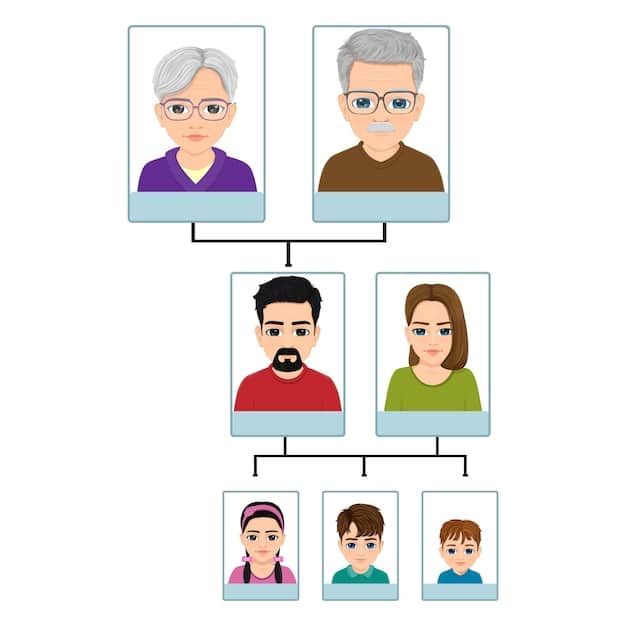Boost Emotional Resilience: The Power of a Strong Support Network

Building a support network is crucial for enhancing emotional resilience, providing a buffer against stress and adversity, and fostering a sense of belonging that can increase emotional well-being by up to 40%.
Feeling overwhelmed and stressed? Discover how building a support network: how strong relationships can enhance your emotional resilience by 40%, turning challenges into opportunities for growth and strength.
Why Building a Support Network Matters for Emotional Resilience
Emotional resilience is your ability to bounce back from difficult experiences. It’s not about avoiding stress, but about navigating it effectively. A strong support network acts as a vital resource in this process, providing emotional, practical, and informational assistance when you need it most.
Think of your support network as a safety net, ready to catch you when you stumble. These connections can significantly enhance your emotional well-being and fortify you against life’s inevitable challenges.
The Science Behind Social Support
Research consistently shows that strong social connections are linked to better mental and physical health. Studies have found that individuals with robust support networks experience lower levels of stress hormones, improved immune function, and a reduced risk of depression and anxiety.
- Reduced Stress: Knowing you have someone to turn to in times of stress can lower cortisol levels.
- Improved Mental Health: Social connections combat feelings of isolation and loneliness.
- Enhanced Physical Health: Strong relationships have been linked to a lower risk of heart disease and a longer lifespan.
In essence, a well-built support network isn’t just a nice-to-have; it’s a fundamental component of your overall well-being.
Identifying Your Current Support System
Before you can actively build a stronger support system, it’s essential to assess your current relationships. Take a moment to consider who you turn to for help, advice, or simply a listening ear. This assessment will reveal the strengths and gaps in your existing network.
Start by listing the people you feel close to, trust, and can rely on. Then, consider the types of support each person provides. Are they primarily emotional supporters, offering empathy and understanding? Or are they more practical, helping with tasks or providing resources?

Mapping Your Relationships
One helpful exercise is to visually map your relationships. Draw a circle representing yourself in the center, and then branch out with lines to represent different people in your life. Label each line with the type of support they provide.
This visual representation can highlight areas where you may be lacking support. For example, you might realize that you have plenty of emotional support but few practical resources.
- Friends: Companionship, shared experiences, emotional support.
- Family: Unconditional love, practical assistance, guidance.
- Colleagues: Professional advice, networking opportunities, workplace support.
- Mentors: Wisdom, career guidance, role modeling.
Understanding the composition of your current support system is the first step towards intentionally building a stronger, more resilient network.
Strategies for Building a Stronger Support Network
Once you’ve identified the gaps in your current support system, you can start taking proactive steps to build stronger connections. This involves both deepening existing relationships and forging new ones. The key is to be intentional and authentic in your efforts.
Building a support requires effort, but the rewards are immeasurable. Strong relationships provide a sense of belonging, boost your self-esteem, and offer a buffer against stress and adversity.
Nurturing Existing Relationships
Sometimes, the strongest support can come from the people already in your life. Nurturing existing relationships involves investing time and effort to deepen your connections. This could involve simply spending more quality time together or being more open and vulnerable in your interactions.
Make an effort to reach out regularly, whether it’s a quick phone call, a text message, or a coffee date. Show genuine interest in their lives and be present when they need you. The more you invest in your relationships, the stronger they will become.
- Practice Active Listening: Pay attention to what others are saying, both verbally and nonverbally.
- Express Gratitude: Let the people in your life know how much you appreciate them.
- Be Reliable: Follow through on your commitments and be there when you say you will.
Expanding Your Circle
In addition to strengthening existing relationships, it’s important to expand your social circle. This involves seeking out new connections with people who share your interests, values, or goals. Joining clubs, attending workshops, or volunteering are all great ways to meet new people.
When meeting new people, be open and approachable. Start conversations, ask questions, and show genuine interest in getting to know them. Remember, building a strong support network is a two-way street.

- Join Clubs and Organizations: Connect with people who share your hobbies and interests.
- Attend Workshops and Events: Learn new skills and meet like-minded individuals.
- Volunteer Your Time: Give back to your community and build relationships with fellow volunteers.
Building a strong support network is about creating a community of people who uplift and support you, no matter what challenges you face.
The Role of Vulnerability and Authenticity
A support network isn’t just about having people around; it’s about having genuinely supportive relationships. Vulnerability and authenticity are key ingredients in building these types of connections. These elements allow for deeper, more meaningful interactions that foster trust and understanding.
Opening up about your struggles, fears, and aspirations may feel daunting, but it can create a bond that transcends superficial acquaintance. Authenticity means being true to yourself and expressing your genuine thoughts and feelings.
Why Vulnerability is Important
Vulnerability allows others to see you as a real person with real emotions, creating a sense of empathy and connection. When you’re willing to share your struggles, others are more likely to reciprocate, leading to a mutual exchange of support and understanding.
It’s important to remember that vulnerability doesn’t mean oversharing or disclosing inappropriate information. It’s about being honest and open with trusted individuals who have earned your confidence.
- Creates Deeper Connections: Vulnerability allows for more meaningful interactions.
- Fosters Trust: Sharing your authentic self builds trust.
- Encourages Reciprocity: When you’re open, others are more likely to be as well.
Practicing Authenticity
Authenticity involves being true to your values, beliefs, and feelings. It means expressing yourself honestly, even when it’s difficult or uncomfortable. When you’re authentic, you attract people who appreciate and accept you for who you are.
Being authentic isn’t about being perfect or always saying the right thing. It’s about being genuine and sincere in your interactions. When you’re authentic, you create a space for others to be themselves as well.
By embracing vulnerability and authenticity, you can build a support network that is rooted in genuine connection and mutual respect.
Maintaining and Strengthening Your Network Over Time
Building a support network is an ongoing process, not a one-time event. To reap the long-term benefits, it’s essential to actively maintain and strengthen your relationships over time. This involves consistent communication, mutual support, and a willingness to adapt to changing circumstances.
Life is dynamic, and your support needs will evolve. As you navigate new challenges and experiences, it’s important to nurture your existing connections and seek out new sources of support as needed.
Consistent Communication
Regular communication is the lifeblood of any relationship. Make an effort to stay in touch with the people in your support network, even when you’re busy or feeling overwhelmed. A simple phone call, text message, or email can go a long way in maintaining a connection.
Schedule regular check-ins with the people who are most important to you. This could be a weekly phone call with a family member, a monthly coffee date with a friend, or a quarterly lunch with a mentor.
- Schedule Regular Check-ins: Make time for consistent communication.
- Be Responsive: Respond promptly to messages and inquiries.
- Use Technology: Leverage social media, video calls, and other tools to stay connected.
Providing Mutual Support
A strong support network is built on reciprocity. Be willing to offer support to the people in your life, just as you expect them to support you. This could involve lending a listening ear, offering practical assistance, or simply being there when they need you.
When someone in your support network is going through a difficult time, reach out and offer your help. Even a small gesture of support can make a big difference. Remember, building an maintaining a strong support requires consistent care and attention.
- Offer a Listening Ear: Be there to listen without judgment.
- Provide Practical Assistance: Help with tasks or errands.
- Offer Encouragement: Provide words of support and motivation.
Measuring the Impact of Your Support Network on Emotional Resilience
While the benefits of a strong support network may seem intuitive, it’s helpful to periodically assess its impact on your emotional resilience. This involves reflecting on how your relationships have influenced your ability to cope with stress, overcome challenges, and maintain a positive outlook.
There are several ways to measure the impact of your support network, ranging from self-assessment to tracking specific outcomes. The key is to identify what aspects of emotional resilience are most important to you and then monitor your progress over time.
Self-Assessment Techniques
One simple way to measure the impact of your support network is through self-assessment. This involves reflecting on your experiences and identifying specific instances where your relationships have helped you navigate difficult situations. Consider the following questions:
- How often do you seek support from others?
- Do you feel comfortable sharing your feelings and experiences with your support network?
- How has your support network helped you cope with stress and adversity?
Tracking Specific Outcomes
Another way to measure the impact of your support network is by tracking specific outcomes related to emotional resilience. This could involve monitoring changes in your stress levels, mood, or overall well-being. Consider using a journal to track your experiences and identify patterns.
Building and maintaining a strong support network is a continuous journey that requires intentional effort and commitment. By investing in your relationships, you can enhance your emotional resilience and navigate life’s challenges with greater ease and confidence.
- Monitor Stress Levels: Track your stress levels over time and see if they decrease as your support network grows.
- Assess Mood and Well-being: Monitor your mood and overall well-being and see if they improve with stronger relationships.
- Identify Coping Strategies: Recognize and track the coping strategies you learn from your support network.
| Key Point | Brief Description |
|---|---|
| 🤝 Strengthen Relationships | Nurture existing bonds for a stable support foundation. |
| 🌱 Expand Your Circle | Seek new connections through shared interests. |
| 💬 Communicate Openly | Maintain regular contact and share openly. |
| 🔄 Reciprocal Support | Offer and accept support to maintain relationships. |
Frequently Asked Questions
▼
Emotional resilience is the ability to bounce back from stress and adversity. It is important because it helps you navigate tough times, maintain mental well-being, and fosters personal growth.
▼
A support network provides emotional, practical, and informational assistance. This reduces stress, combats loneliness, and offers diverse coping strategies, boosting your resilience.
▼
To nurture relationships, practice active listening, express gratitude, and be reliable. Regular communication, shared activities, and showing genuine interest are also essential.
▼
Expand your social circle by joining clubs, attending workshops, and volunteering. Approach new people with openness and curiosity, and engage in shared activities.
▼
Vulnerability and authenticity foster deeper trust. Share your true self and listen without judgement. Building a network is a long term investment.
Conclusion
Ultimately, building a support network: how strong relationships can enhance your emotional resilience by 40% is an investment in your overall well-being. By nurturing existing connections, expanding your social circle, and embracing vulnerability, you can create a network that empowers you to navigate life’s challenges with greater strength and resilience.





